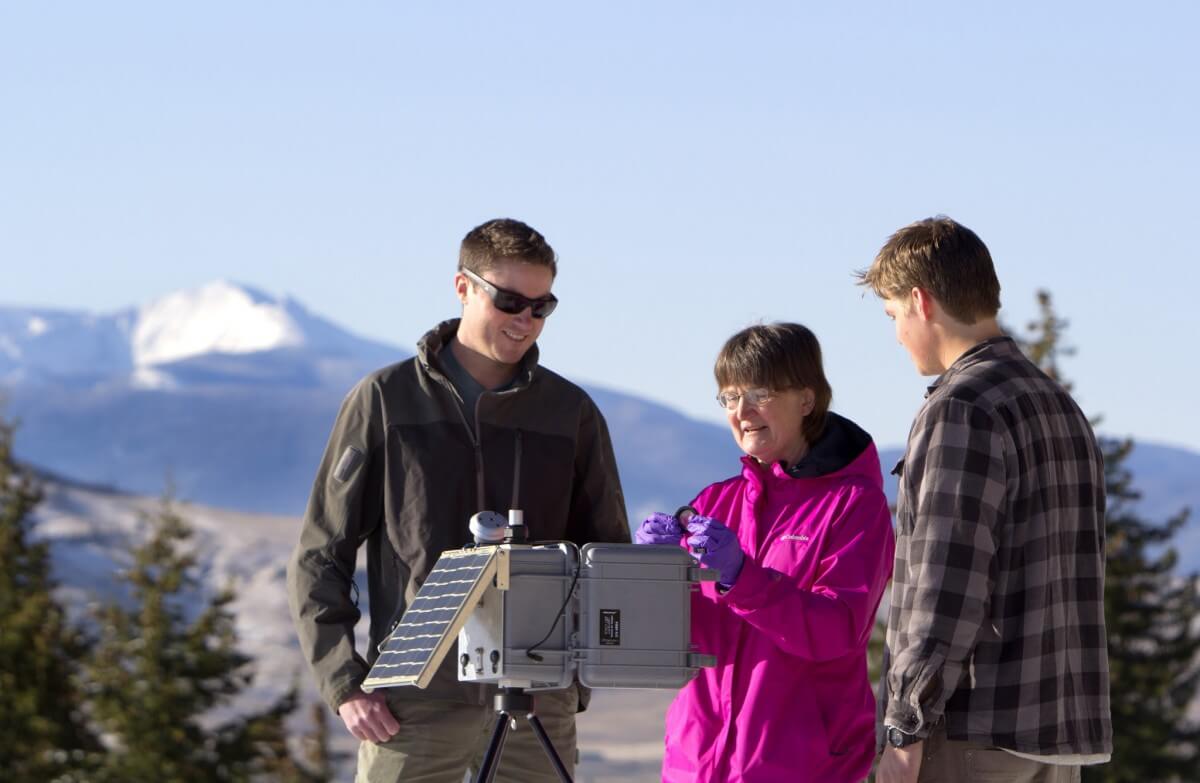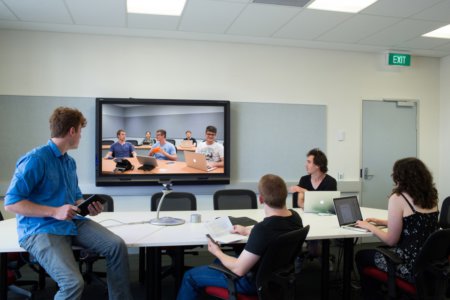
The STEM fields are facing a critical shortage of female representation.
United Nations data show that only 3% of students enrolling in information and communication technology (ICT) courses across the globe are female. That improves slightly to 5% for mathematics and statistics courses. The numbers are slightly better with 8% for engineering courses.
Additionally, data from the UN Scientific Education and Cultural Organisation (UNESCO) suggests that fewer than 30% of researchers worldwide are women and only 30% of female students select STEM-related fields in higher education.
To improve these numbers, universities all over the world have made it their mission to encourage more women to specialise in a STEM field.
After all, history have shown that they are more than capable of changing the world. Katherine Johnson was awarded the Presidential Medal of Freedom in 2015 for a lifetime of work as a pioneering physicist, mathematician and space scientist. Radia Perlman developed the algorithm behind the Spanning Tree Protocol (STP), an innovation that made today’s Internet possible. Florence Nightingale was the inventor of modern nursing, responsible for presenting some of the earliest statistical data in graphic form, and making it a more common practice.
To follow in their footsteps, here are four universities with top-ranked STEM programmes:
School of Informatics, University of Edinburgh
The School of Informatics is currently ranked fifth in the UK and 22nd in the world for Computer Science in the 2021 Times Higher Education World University Rankings by subject. These numbers are impressive, but the story behind them is better. What places one university above the other in the rankings depends on, for the most part, its teaching, research and influence. THE examines and grades the institution’s learning environment, research volume and impact, international outlook as well innovation and industry income.

Google, Facebook, Amazon, IBM, SkyScanner, Intel, Samsung and more love employing Edinburgh alumni. Source: University of Edinburgh
The School of Informatics scores high in all these categories. A look at its curricula tells us why. The undergraduate and postgraduate programmes here — covering subjects such as computer science, artificial intelligence, informatics as well as cognitive science and software engineering, among others — offer both breadth and depth. Many universities offer a strong foundation in computer science, but at Edinburgh, this is coupled with fresh perspectives on the ways computational thinking can be applied to different settings. Each student also receives prime academic, pastoral and peer support, plus plenty of opportunities to get involved with student societies, including the biggest tech society in Scotland: CompSoc.
Courses range from algorithmic game theory, blockchain and distributed ledgers to computer animation and human-computer interaction — expect the theoretical to be fused with the practical in these. The result? Students build a solid scientific understanding of computer-based systems and gain the practical skills to analyse, design, implement and maintain them in any setting. They can tailor their learning experience to their own interests too — another distinctive Edinburgh offering.
Robust links with industry let these programmes come to life through internships at some of the top companies in the world. Edinburgh, a hot spot for Data Science, Artificial Intelligence and Robotics with strong commercial links, offers numerous opportunities for placements and internships. In 2019, the university’s undergraduate prize sponsors included IBM, Amazon, Sky, JP Morgan, and Microsoft.
Add Facebook, Intel, RockStar North, RBS, as well as Citigroup, and the list turns into popular graduate destinations for its students. Nine out of 10 graduates go into employment — many are sought after by employers, an increasing number of which are relying on computer systems, from media to entertainment and medicine — or further study. A number start their own businesses.
To learn more about these highly competitive programmes, click here for undergraduate and here for postgraduate. A strong math background is essential, but not computer science/programming.
School of Computer Science and Electronic Engineering, Bangor University
Bangor University’s School of Computer Science and Electronic Engineering presents several opportunities for students to learn more about the latest developments in computing and electronic technologies. Facilitating this growth is a wide range of courses taught by world leaders in an even broader range of technologies.

Students here get to apply their knowledge in computer and networking laboratories. Source: Bangor University
These courses are accredited by professional bodies like the British Computer Society and the Institution of Engineering and Technology. Additionally, the school ranked among the top 10 this year for student satisfaction in the UK. It has also achieved the TEF Gold standard in teaching excellence in 2017.
When it comes to research, the theme of excellence persists. From AI and pattern recognition to data visualisation; medical microwave electronics and medical simulation; optoelectronics, broadband and optical communications –– amongst many more –– students undertake their individual and team projects in close collaboration with their mentors who double as professors.
Students also get to apply their knowledge in computer and networking laboratories, a state-of-the art electronic laboratory, extensive research laboratories and a Class 1000 electronics cleanroom.
It’s an experience open to all, and Bangor has the recognition to prove it. Last year, the school was awarded the Athena SWAN Bronze Award for its ongoing commitment to gender equality among staff and students.
School of Engineering, University of Manchester

Today, more female students are making waves in this school than ever before. Source: University of Manchester
The University of Manchester’s School of Engineering develops engineering solutions to make ethical and sustainable improvements to society. They do this in two ways: excellent research and teaching in science-based engineering. Everyone is welcome to join.
“Our diverse body of engineering staff and students work together to help reshape the world, developing skills in everything from robotics, green processing and artificial intelligence, to healthcare technologies, low-carbon infrastructure and digital engineering,” says Professor Alice Larkin, head of the School of Engineering. “We are proud to foster a sense of curiosity, creativity and innovation to address real world problems.”
Four departments make up the school: the Department of Chemical Engineering and Analytical Science; the Department of Computer Science; the Department of Electrical and Electronic Engineering; and the Department of Mechanical, Aerospace and Civil Engineering.
Collectively, they collaborate with the university’s School of Natural Sciences to further develop engineers and scientists who are technically strong, analytically innovative, and creative.
Today, more female students are making waves in the school than ever before –– at both Undergraduate and postgraduate levels. They arrive at the university ready to be taught and nurtured by an inspiring group of female staffers when they aren’t benefiting from the School of Engineering’s award-winning peer-to-peer mentor scheme.
College of Engineering, University of Exeter

The University of Exeter’s College of Engineering, Mathematics and Physical Sciences offers seven subject areas. Source: University of Exeter
Home to 2,671 undergraduates, 278 postgraduate taught students, and 364 postgraduate research students –– the University of Exeter’s College of Engineering, Mathematics and Physical Sciences is where individuals learn about the latest ideas in science and technology. To do so, the school comprises seven subject areas: computer science; engineering; geology; mathematics; mining and minerals engineering; physics and astronomy; and renewable energy.
Across programmes, interdisciplinary research plays a crucial role. “Our research expertise includes modelling climate change, creating sustainable urban water supplies, disease modelling, new optical imaging techniques to treat brain disease, and blast-proof materials,” explains Professor Zhongdong Wang, pro vice-chancellor and executive dean.
Additionally, expert researchers make it possible for students to witness and experience finding answers to the world’s biggest challenges. Together, they make key contributions to the Institute for Data Science and Artificial Intelligence (IDSAI), the Global Systems Institute (GSI), the Living Systems Institute (LSI) and the Environment and Sustainability Institute (ESI).
The university is also a proud member of the Athena SWAN Charter and has held a Bronze institutional award since November 2011.
The award recognises the University of Manchester’s efforts to progress gender equality within its organisation and their commitment to continue doing so in the future.
*Some of the institutions featured on this article are commercial partners of Study International










